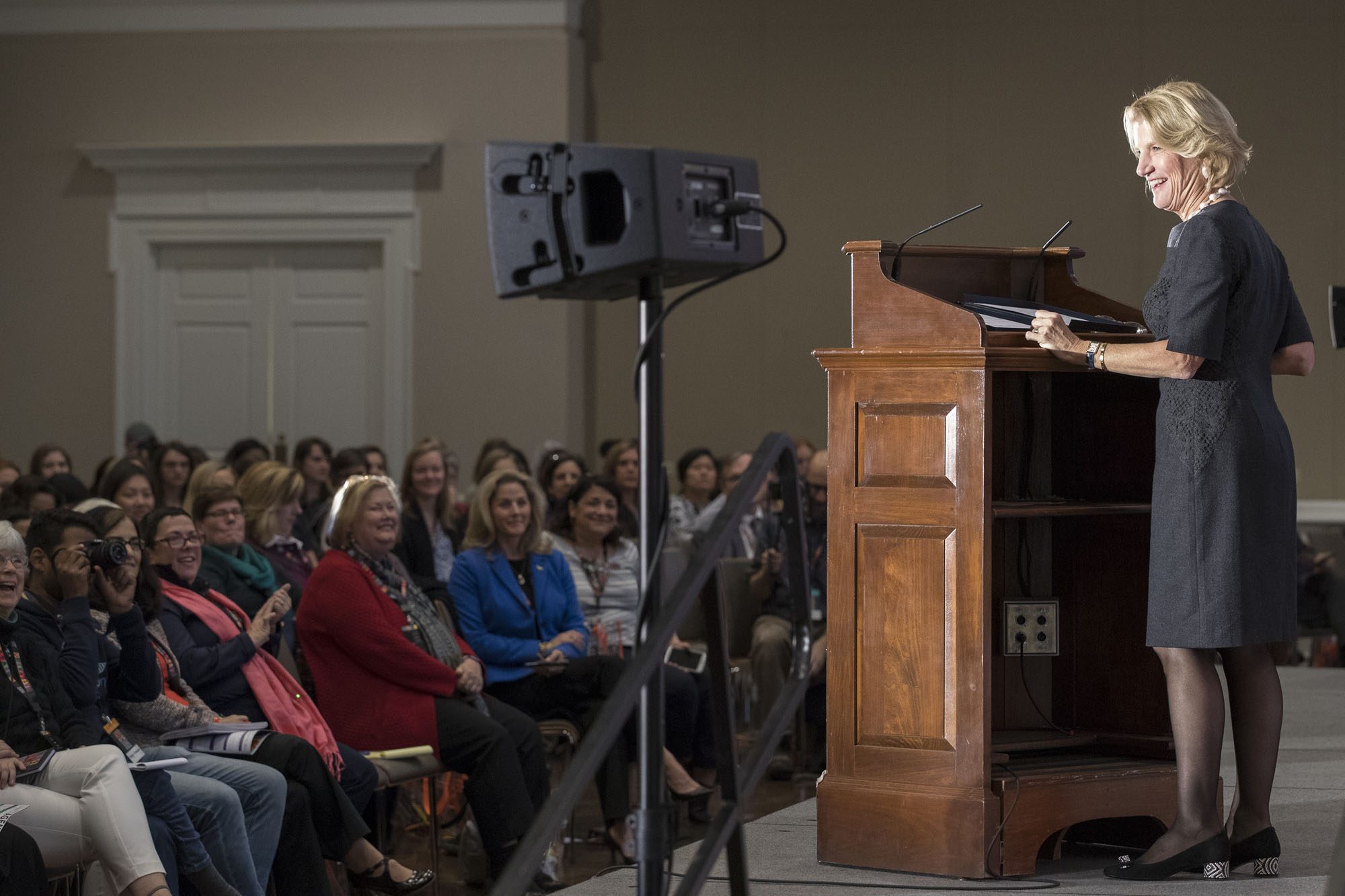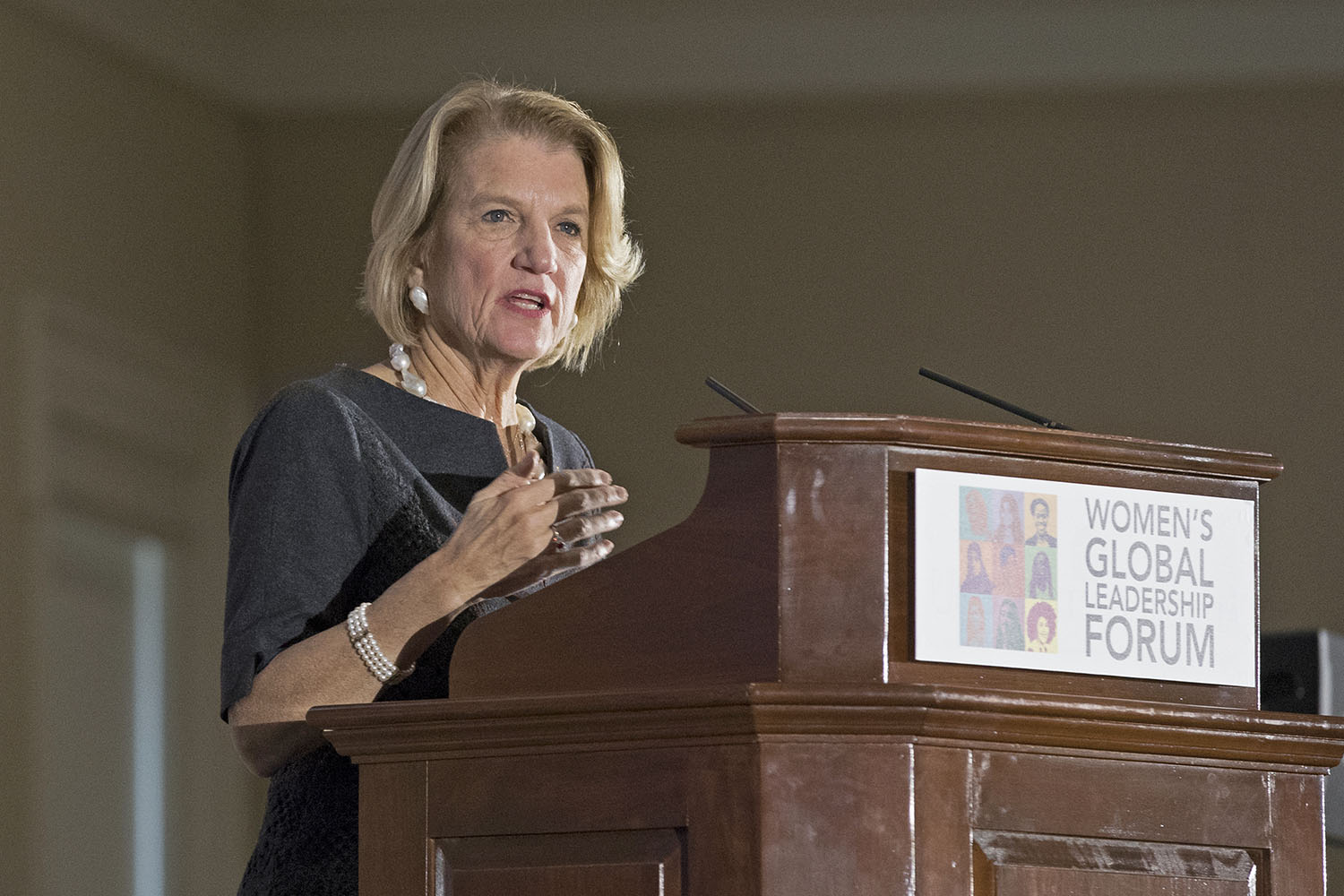Women may be the key to breaking political gridlock in Washington, the first woman to be elected to the U.S. Senate from West Virginia told a University of Virginia audience on Monday.
As an example, Republican U.S. Sen. Shelley Moore Capito pointed to her recent dealings with a colleague from the other side of the aisle, Sen. Elizabeth Warren of Massachusetts.
“I work with Elizabeth Warren,” she said. “I’m not going to get political here, but we don’t have a lot of similarities in our beliefs.

“But we believe that if you are going to get a prescription for an opioid medication, you shouldn’t walk out with 56 pills if you only have a toothache,” she said.
Capito, a UVA alumna, was the keynote speaker at the Women’s Global Leadership Forum, a two-day event that began Monday and closes Tuesday with an address from former Democratic presidential nominee Hillary Rodham Clinton.
Capito and Warren’s legislation allowing patients to receive less than a full prescription’s worth of medicines like OxyContin and Vicodin was passed last year.
The senator held up that legislative collaboration as a lesson in how well women in Congress work together.
“There have been studies on this,” she told the large crowd assembled in the Newcomb Hall Ballroom for the forum, part of the University’s bicentennial celebration.
“How many articles have you read that say when there is an impasse, the women of the Senate have a way of collaborating … together? We work across the aisle better,” she said.
And it’s not just that women collaborate better, Capito said. Women are also good listeners, and listening leads to success. “I think we speak much more forcefully when we listen first,” she said.
Capito credited some of her success in listening to her time at UVA. She earned a master’s degree in counseling from the Curry School of Education in 1976. “When I look back at my time here at UVA, what I learned from the Curry School were a lot of really valuable skills. I learned to listen. I learned to support. I learned to reflect. I learned to interpret.
“I do my best to listen to everyone,” she said. “To my constituents, to the ones I agree with and to the ones I do not agree with, or don’t agree with me, more likely,” she added, laughing.
She turned again to the opioid epidemic and what is being done in her state, the hardest-hit in the country. Local leaders told her one way to fight the diseases that come with intravenous drug use is to implement a needle exchange program. “My mind was totally closed to this,” she said.
To her, swapping used needles for clean ones would encourage, not curb, drug use. But the senator said she decided to listen. The experts told her the program would save lives, ease health costs and prevent diseases like HIV and hepatitis C from spreading in the community.
“They really opened my mind, because I listened to what they were saying,” she said. Now there are at least eight exchange programs in the state and an added benefit is that they bring drug users in contact with addiction counselors they can talk to.
Capito said women’s innate preference for collaboration makes them integral to the success of any institution, be it a business or government.
“We are making significant strides in putting ourselves in the position to lead,” she said, adding that the number of women leaders is growing around the world. She pointed to 39 young, emerging leaders from 37 countries in the audience who were guests of the Presidential Precinct, a consortium of UVA; William & Mary; Thomas Jefferson’s Monticello; UVA’s Morven; Highland, the presidential home of James Monroe; and Montpelier, the home of President James Madison.
To underscore her belief that listening is key to success, Capito closed her formal remarks by urging the audience to commit to making the 21st century one in which women shape a better world.
Quoting Thomas Jefferson, she said: “‘To learn, you have to listen. To improve, you have to try.’ So let’s listen and let’s improve.”
Media Contact
Article Information
November 13, 2017
/content/wvas-first-female-us-senator-says-listening-key-success

